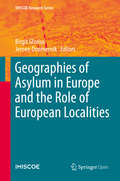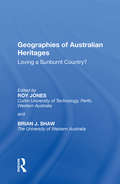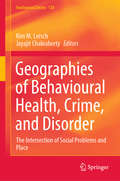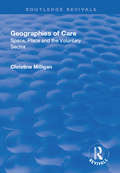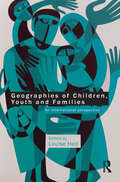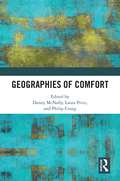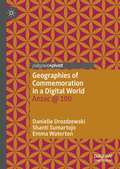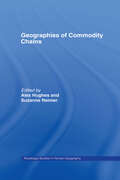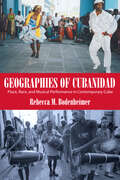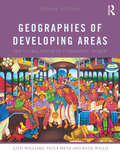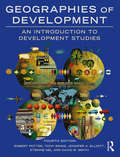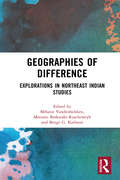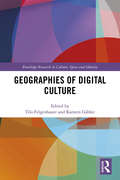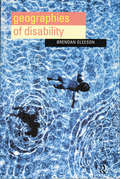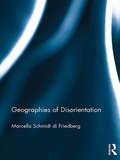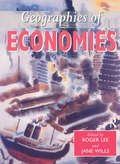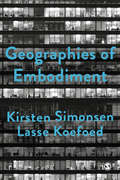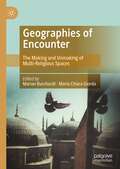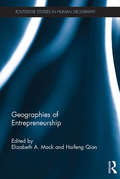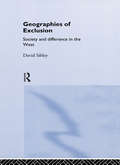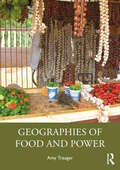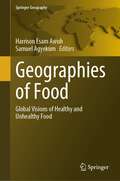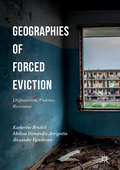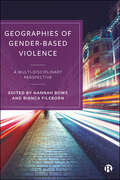- Table View
- List View
Geographies of Asylum in Europe and the Role of European Localities (IMISCOE Research Series)
by Birgit Glorius Jeroen DoomernikThis open access book describes how the numerous arrivals of asylum seekers since 2015 shaped reception and integration processes in Europe. It addresses the structuration of asylum and reception systems, and spaces and places of reception on European, national, regional and local level. It also analyses perceptions and discourses on asylum and refugees, their evolvement and the consequences for policy development. Furthermore, it examines practices and policy developments in the field of refugee reception and integration. The volume shows and explains a variety of refugee reception and integration strategies and practices as specific outcome of multilevel governance processes in Europe. By addressing and contextualizing those multiple experiences of asylum seeker reception, the book is a valuable contribution to the literature on migration and integration, societal development and political culture in Europe.
Geographies of Australian Heritages: Loving a Sunburnt Country? (Heritage, Culture And Identity Ser.)
by Roy JonesIn any settler and/or postcolonial society, heritage is a complex and contested topic that involves indigenous, imperial and other migrant components. In Australia, this situation is compounded by the unique characteristics of the country's natural environment, the considerable diversity of its migrant intake and the demographic and technological imbalances between its indigenous and settler populations. This volume brings together internationally recognized academics and emerging scholars, whose expertise extends through the areas of tourism, planning, heritage management, environmental studies and state and local government. Through a representative set of case studies from across the country's states and capital cities, the contributors demonstrate the range and diversity of heritage issues currently confronting Australia, and consider possible ways of resolving these.
Geographies of Behavioural Health, Crime, and Disorder: The Intersection of Social Problems and Place (GeoJournal Library #126)
by Jayajit Chakraborty Kim M. LerschThis book focuses on the intersection of place and overall community health thereby focusing on some of the most critical contemporary social problems, including the opioid crisis, suicide, socioeconomic status and ethnicity, mental illness, crime, homelessness, green criminology, and social and environmental justice. Scholars from a variety of disciplines, including geography, sociology, criminology, mental health, social work, and behavioural sciences discuss the importance of geography in our quality of life. Each chapter introduces the reader to an overview of the topic, presents theoretical frameworks and the most recent empirical evidence, and discusses real world policy implications. As such this book is a key resource for researchers, policy makers, and practitioners working in the field.
Geographies of Care: Space, Place and the Voluntary Sector (Routledge Revivals)
by Christine MilliganThis title was first published in 2001. As care services in Britain have moved from institutional to community-based environments, there has been a simultaneous shift in those agencies concerned with the provision of such care and support. this new environment of care is a complex one, involving numerous different actors and agencies that operate across various different spatial and organizational levels of the policy process. The implementation and success of care policies depend in part on the inter-relationships between these various players. This book examines these inter-relationships, illustrated by an in-depth empirical study of policy makers and informal care providers concerned with the frail elderly in Scotland. Taking the voluntary sector as a lens through which these inter-relationships are explored, it analyzes how voluntary support is affected by differing local contexts of care and what this means in terms of locally based care outcomes.
Geographies of Children, Youth and Families: An International Perspective
by Louise HoltThis edited collection brings together international experts from the vibrant and growing field of geographies of children, youth and families. Designed as an introduction to the topic, this book provides an overview of current conceptual and theoretical debates surrounding geographies of children, youth and families, and gives a wide range of examples of cutting-edge research from a variety of national contexts across the globe. The theme of ‘disentangling the socio-spatial contexts of young people and/or their families’ advances debates in the field by emphasising the context of young people’s social agency. Geographies of Children, Youth and Families is an invaluable course text for undergraduate and postgraduate students of geography and the social sciences, as well as being of interest to students and practitioners of education, youth work, social policy, and social work.
Geographies of Comfort
by Danny McNally, Laura Price, and Philip CrangBringing together conceptual and empirical research from leading thinkers, this book critically examines ‘comfort’ in everyday life in an era of continually occurring social, political and environmental changes. Comfort and discomfort have assumed a central position in a range of works examining the relations between place and emotion, the senses, affect and materiality. This book argues that the emergence of this theme reflects how questions of comfort intersect humanistic, cultural-political and materialist registers of understanding the world. It highlights how geographies of comfort becomes a timely concern for Human Geography after its cultural, emotional and affective aspects. More specifically, comfort has become a vital theme for work on mobilities, home, environment and environmentalism, sociability in public space and the body. ‘Comfort’ is recognized as more than just a sensory experience through which we understand the world; its presence, absence and pursuit actively make and un-make the world. In light of this recognition, this book engages deeply with ‘comfort’ as both an analytic approach and an object of analysis. This book offers international and interdisciplinary perspectives that deploys the lens of comfort to make sense of the textures of everyday life in a variety of geographical contexts. It will appeal to those working in human geography, anthropology, feminist theory, cultural studies and sociology.
Geographies of Commemoration in a Digital World: Anzac @ 100
by Emma Waterton Shanti Sumartojo Danielle DrozdzewskiThis book reframes commemoration through distinctly geographical lenses, locating it within experiential and digital worlds. It interrogates the role of power in representations of memory and shows how experiences of commemoration sit within, alongside and in contrast to its official normative forms. The book charts how memories, places and experiences of commemoration play out and have, or have not, changed in and through a digital world. Key to the book’s exploration is a new epistemology of memory, underpinned by an embodied research approach.
Geographies of Commodity Chains (Routledge Studies in Human Geography #Vol. 10)
by Alex Hughes Suzanne ReimerIndividuals, consumer groups, nation states and supra-national bodies increasingly have interrogated the ethics of particular production and consumption relations such as GM foods. Flowing from and bound up with these political concerns is the growing interest in the mutual dependence of sites of (for example) production, distribution, retailing, design, advertising, marketing and final consumption. This timely volume draws together contributions concerned with the production, circulation and consumption of commodities. Not only do these case study examples seek to transcend older understandings of production and consumption, but they also explicitly tap into wider public debate about the meanings, origins and biographies of commodities. Taking a geographical approach to the analysis of links between producers and consumers, the book focuses upon the ways in which these ties increasingly are stretched across spaces and places. Critical engagements with the ways in which these spaces and places affect the economies, cultures and politics of the connections between producers and consumers are skilfully threaded through each section.
Geographies of Cubanidad: Place, Race, and Musical Performance in Contemporary Cuba (Caribbean Studies Series)
by Rebecca M. BodenheimerDerived from the nationalist writings of José Martí, the concept of Cubanidad (Cubanness) has always imagined a unified hybrid nation where racial difference is nonexistent and nationality trumps all other axes identities. Scholars have critiqued this celebration of racial mixture, highlighting a gap between the claim of racial harmony and the realities of inequality faced by Afro-Cubans since independence in 1898. In this book, Rebecca M. Bodenheimer argues that it is not only the recognition of racial difference that threatens to divide the nation, but that popular regional sentiment further contests the hegemonic national discourse. Given that the music is a prominent symbol of Cubanidad, musical practices play an important role in constructing regional, local, and national identities. This book suggests that regional identity exerts a significant influence on the aesthetic choices made by Cuban musicians. Through the examination of several genres, Bodenheimer explores the various ways that race and place are entangled in contemporary Cuban music. She argues that racialized notions which circulate about different cities affect both the formation of local identity and musical performance. Thus, the musical practices discussed in the book—including rumba, timba, eastern Cuban folklore, and son—are examples of the intersections between regional identity formation, racialized notions of place, and music-making.
Geographies of Developing Areas: The Global South in a Changing World
by Glyn Williams Katie Willis Paula MethGeographies of Developing Areas is a thought provoking and accessible introductory text, presenting a fresh view of the Global South that challenges students' pre-conceptions and promotes lively debate. Rather than presenting the Global South as a set of problems, from rapid urbanization to poverty, this book focuses on the diversity of life in the South, and looks at the role the South plays in shaping and responding to current global change. The core contents of the book integrate 'traditional' concerns of development geographers, such as economic development and social inequality, with aspects of the global South that are usually given less attention, such as cultural identity and political conflict. This edition has been fully updated to reflect recent changes in the field and highlight issues of security, risk and violence; environmental sustainability and climate change; and the impact of ICT on patterns of North-South and South-South exchange. It also challenges students to think about how space is important in both the directions and the outcomes of change in the Global South, emphasizing the inherently spatial nature of political, economic and socio-cultural processes. Students are introduced to the Global South via contemporary debates in development and current research in cultural, economic and political geographies of developing areas. The textbook consider how images of the so-called 'Third World' are powerful, but problematic. It explores the economic, political and cultural processes shaping the South at the global scale and the impact that these have on people's lives and identities. Finally, the text considers the possibilities and limitations of different development strategies. The main arguments of the book are richly illustrated through case study material drawn from across the Global South as well as full colour figures and photos. Students are supported throughout with clear examples, explanations of key terms, ideas and debates, and introductions to the wider literature and relevant websites in the field. The pedagogical features of the book have been further developed through discussion questions and activities that provide focused tasks for students' research, including investigation based around the book's case studies, and in-depth exploration of debates and concepts it introduces.
Geographies of Development: An Introduction to Development Studies
by Robert Potter Tony Binns David W. Smith Etienne Nel Jennifer A. ElliottNow in its fourth edition, Geographies of Development: An Introduction to Development Studies remains a core, balanced and comprehensive introductory textbook for students of Development Studies, Development Geography and related fields. This clear and concise text encourages critical engagement by integrating theory alongside practice and related key topics throughout. It demonstrates informatively that ideas concerning development have been many and varied and highly contested - varying from time to time and from place to place. <P><P> Clearly written and accessible for students, who have no prior knowledge of development, the book provides the basics in terms of a geographical approach to development what situation is, where, when and why. Over 200 maps, charts, tables, textboxes and pictures break up the text and offer alternative ways of showing the information. The text is further enhanced by a range of pedagogical features: chapter outlines, case studies, key thinkers, critical reflections, key points and summaries, discussion topics and further reading. <P><P> Geographies of Development continues to be an invaluable introductory text not only for geography students, but also anyone in area studies, international studies and development studies.
Geographies of Difference: Explorations in Northeast Indian Studies
by Mélanie Vandenhelsken Meenaxi Barkataki-Ruscheweyh Bengt G. KarlssonThis book rethinks Northeast India as a lived space, a centre of interconnections and unfolding histories, instead of an isolated periphery. Questioning dominant tropes and assumptions around the Northeast, it examines socio-political and historical processes, border issues, the role of the state, displacement and development, debates over natural resources, violence, notions of body and belonging, movements, tensions and relations, and strategies, struggles and narratives that frame discussions on the region. Drawing on current and emerging research in Northeast India studies, this work will be of great interest to scholars and researchers of politics, human geography, sociology and social anthropology, history, cultural studies, media studies and South Asian studies.
Geographies of Digital Culture (Routledge Research in Culture, Space and Identity)
by Tilo Felgenhauer Karsten Gäbler“Digital culture” reflects the ways in which the ubiquity and increasing use of digital devices and infrastructures is changing the arenas of human experience, creating new cultural realities. Whereas much of the existing literature on digital culture addresses the topic through a sociological, anthropological, or media theoretic lens, this book focuses on its geographic aspects. The first section, “infrastructures and networked practices” highlights the integration of digital technologies into everyday practices in very different historical and geographical contexts—ranging from local lifeworlds, urban environments, web cartographies up to global geopolitics. The second section on “subjectivities and identities” shows how digital technology use possesses the capacity to alter the subjective, perceptive, and affective engagement with the spatial world. Finally, “politics and inequalities” investigates the social and spatial disparities concerning digital technology and its use. This book draws attention to the deep interconnectedness of the cultural, digital, and spatial aspects of everyday practices by referring to a broad range of empirical examples taken from tourism, banking, mobility, and health. Scholars in human geography, anthropology, media and communication studies, and history will find this research indispensable reading. It addresses both young and seasoned researchers as well as advanced students in the aforementioned disciplines. The wealth of examples also makes this publication helpful in academic teaching.
Geographies of Disability
by Brendan GleesonThis book explains how space, place and mobility have shaped the experiences of disabled people both in the past and in contemporary societies. The key features of this insightful study include:* a critical appraisal of theories of disability and a new disability model* case studies to explore how the transition to capitalism disadvantaged disabled people* an exploration of the Western city and the policies of community care and accessibility regulation. Brendan Gleeson presents an important contribution to the major policy debates on disability in Western societies and offers new considerations for the broader debates on embodiment and space within Geography.
Geographies of Disorientation
by Marcella Schmidt di FriedbergSpatial disorientation is of key relevance to our globalized world, eliciting complex questions about our relationship with technology and the last remaining vestiges of our animal nature. Viewed more broadly, disorientation is a profoundly geographical theme that concerns our relationship with space, places, the body, emotions, and time, as well as being a powerful and frequently recurring metaphor in art, philosophy, and literature. Using multiple perspectives, lenses, methodological tools, and scales, Geographies of Disorientation addresses questions such as: How do we orient ourselves? What are the cognitive and cultural instruments that we use to move through space? Why do we get lost? Two main threads run through the book: getting lost as a practice, explored within a post-phenomenological framework in relation to direct and indirect observation, wayfinding performances, and the various methods and tools used to find our position in space; and disorientation as a metaphor for the contemporary era, used in a broad range of contexts to express the difficulty of finding points of reference in the world we live in. Drawing on a wide range of literature, Geographies of Disorientation is a highly original and intruiging read which will be of interest to scholars of human geography, philosophy, sociology, anthropology, cognitive science, information technology, and the communication sciences.
Geographies of Economies
by Roger Lee Jane WillsSetting out to explore the intersections of economy and geography, this book brings together contributions from the world's top economic geographers.Over forty contributors draw upon contemporary theory and experience to explore the cultural and social constitution of economic geographies, processes of globalisation and new forms of political regulation and practice. Although focusing upon 'new' economic geography, the book also illustrates the many connections with previous scholarship as scholars seek to reconstruct the traditions of political economy to understand the contemporary world.Highlighting and illustrating contemporary developments, the book opens up discussion about the implications of the complex geographies involved. In pointing to new directions of research and debate, this major statement in state of the art economic geography demonstrates the central relevance of economic geography not only in understanding the trajectories of change but in proposing alternatives.
Geographies of Embodiment: Critical Phenomenology and the World of Strangers (Society and Space)
by Kirsten Simonsen Lasse KoefoedGeographies of Embodiment provides a critical discussion of the literatures on the body and embodiment, and humanism and post-humanism, and develops arguments about "otherness" and "encounter" which have become key ideas in urban studies, and studies of the city. It situates these arguments in a wider political context, looking at power-relations through case studies at urban, national and transnational scales. These arguments are situated across disciplinary boundaries, at the borderline between between philosophy and social science that is associated to critical phenomenology, and reaches across Human Geography, Sociology, Philosophy, Anthropology, Cultural Studies and Urban Studies.
Geographies of Embodiment: Critical Phenomenology and the World of Strangers (Society and Space)
by Kirsten Simonsen Lasse KoefoedGeographies of Embodiment provides a critical discussion of the literatures on the body and embodiment, and humanism and post-humanism, and develops arguments about "otherness" and "encounter" which have become key ideas in urban studies, and studies of the city. It situates these arguments in a wider political context, looking at power-relations through case studies at urban, national and transnational scales. These arguments are situated across disciplinary boundaries, at the borderline between between philosophy and social science that is associated to critical phenomenology, and reaches across Human Geography, Sociology, Philosophy, Anthropology, Cultural Studies and Urban Studies.
Geographies of Encounter: The Making and Unmaking of Multi-Religious Spaces
by Marian Burchardt Maria Chiara GiordaThis edited collection explores forms of multi-religious cohabitation as well as the spatial arrangements that underpin and shape them through sixteen chapters that range across disciplines, historical periods, and global geographies. Focusing on interactions between different religious groups and traditions, the authors conceptualize three types of spatial arrangements and explore how they operate ad geographies of encounter; i.e., multi-religious places, multi-religious cities, and multi-religious landscapes. With perspectives from anthropologists, historians, sociologists, and geographers, the book demonstrates the multiple ways in which geographies of interreligious encounters and forms of multi-religious cohabitation have changed throughout history due to their embeddedness id different frameworks of political organization, shifting religious ideologies, and changing forms of human mobility.
Geographies of Entrepreneurship (Routledge Studies in Human Geography)
by Elizabeth A. Mack Haifeng QianThis book addresses a gap in the present literature on the role that geography plays in the distribution of entrepreneurial activity. Emerging work on entrepreneurial ecosystems suggests it is important entrepreneurship studies move beyond the mere identification of factors that impact entrepreneurial activity to consider the unique geographic contexts in which entrepreneurs operate. These contexts include a variety of interactive elements including regional characteristics, institutions, actors, and connectors. As such, this collection analyses entrepreneurial activity in regions around the globe. The contributions explore a series of diverse regions in terms of their geographic, historical, industrial, and institutional contexts. The book also explores a range of topics, such as patterns of regional/subnational variations in entrepreneurial activity, geographically mediated determinants of entrepreneurship, inter-temporal dynamics, evolution of regional systems of entrepreneurship, and the impact of entrepreneurship on regional development and regional entrepreneurship policy. This book enhances our policy and practical knowledge about the unique regional context in which entrepreneurs operate and demonstrates the important role that geography plays in the spatial distribution of entrepreneurial activity.
Geographies of Exclusion: Society and Difference in the West
by David SibleyImages of exclusion characterised western cultures over long historical periods. In the developed society of racism, sexism and the marginalisation of minority groups, exclusion has become the dominant factor in the creation of social and spatial boundaries. Geographies of Exclusion seeks to identify the forms of social and spatial exclusion, and subsequently examine the fate of knowledge of space and society which has been produced by members of excluded groups. Evaluating writing on urban society by women and black writers the author asks why such work is neglected by the academic establishment, suggesting that both practices which result in the exclusion of minorities and those which result in the exclusion of knowledge have important implications for theory and method in human geography. Drawing on a wide range of ideas from social anthropology, feminist theory, sociology, human geography and psychoanalysis, the book presents a fresh approach to geographical theory, highlighting the tendency of powerful groups to purify' space and to view minorities as defiled and polluting, and exploring the nature of difference' and the production of knowledge.
Geographies of Food and Power
by Amy TraugerThis book provides a comprehensive overview of the production and consumption of food, suitable for use in undergraduate classrooms, either at the intermediate or advanced level. It takes an intersectional approach to difference and power and approaches standard subjects in the geography of food with a fresh perspective focusing on inequality, uneven production and legacies of colonialism. The book also focuses on places and regions often overlooked in conventional narratives, such as the Americas in the domestication of plants. The topics covered in the textbook include: descriptions and analyses of food systems histories of agricultural development with a focus on the roles of different regions major commodities such as meat, grains and produce with a focus on the place of production contemporary challenges in the food system, including labor, disasters/conflict and climate change recent and emerging trends in food and agriculture such as lab-grown meat and vertical urban farms Geographies of Food and Power takes a synthetic approach by discussing food as something produced within an interconnected system, in which labor, food quality and the environment are considered together. It will be a valuable resource for students of human geography, environmental geography, economic geography, food studies and development.
Geographies of Food: Global Visions of Healthy and Unhealthy Food (Springer Geography)
by Harrison Esam Awuh Samuel AgyekumThe book offers a multi-scale, epistemically diverse, and sense-making perspectives on the food system. The book argues that sustainable food system transformation is a complex proposition that can better thrive upon the inclusion of consumer perspectives. The book brings together scholarly works of critical scholars and practitioners who bring to bear the uniqueness of places, cultures, histories and interactions in the milieu of food.
Geographies of Forced Eviction: Dispossession, Violence, Resistance
by Melissa Fernández Arrigoitia Katherine Brickell Alexander VasudevanThis book offers a close look at forced evictions, drawing on empirical studies and conceptual frameworks from both the Global North and South. It draws attention to arenas where multiple logics of urban dispossession, violence and insecurity are manifest, and where wider socio-economic, political and legal struggles converge. The authors highlight the need to apply emotional and affective registers of dispossession and insecurity to the socio-political and financial economies driving forced evictions across geographic scales. The chapters each consider the distinct urban logics of precarious housing or involuntary displacements that stretch across London, Barcelona, Rio de Janeiro, Shanghai and Colombo. A timely addition to existing literature on urban studies, this collection will be of great interest to policy makers and scholars of human geography, development studies, and sociology.
Geographies of Gender-Based Violence: A Multi-Disciplinary Perspective
by Hannah Bows and Bianca FilebornWhat role does physical and virtual space play in gender-based violence (GBV)? Experts from the Global North and South use wide-ranging case studies - from public harassment in India and Kenya to harassment on Twitter - to examine how spaces can facilitate or prevent GBV and showcase strategies for prevention and intervention. Students and academics from a range of disciplines will discover how existing research connects with practice and policy developments, the current gaps in research and a future agenda for GBV studies.
